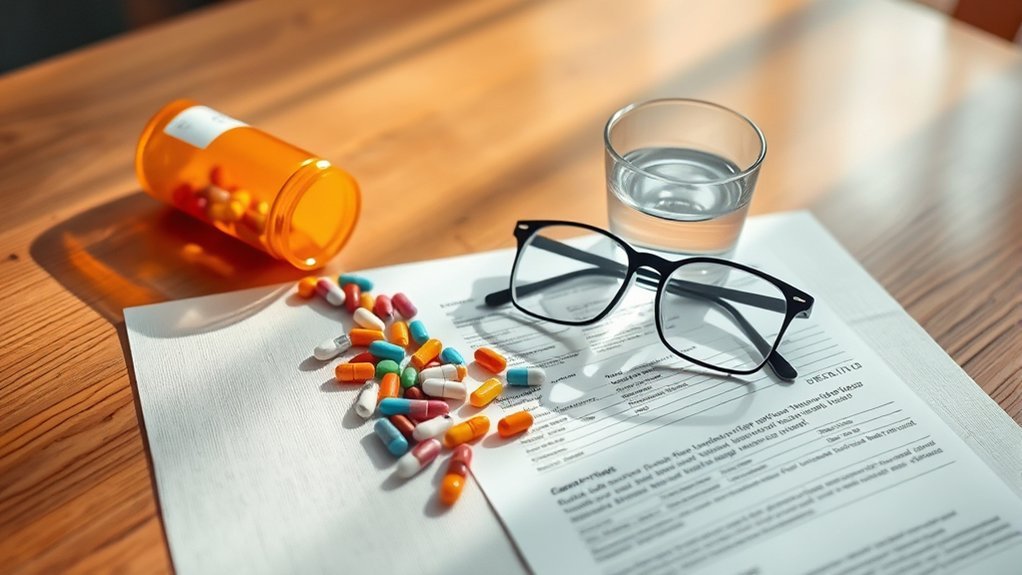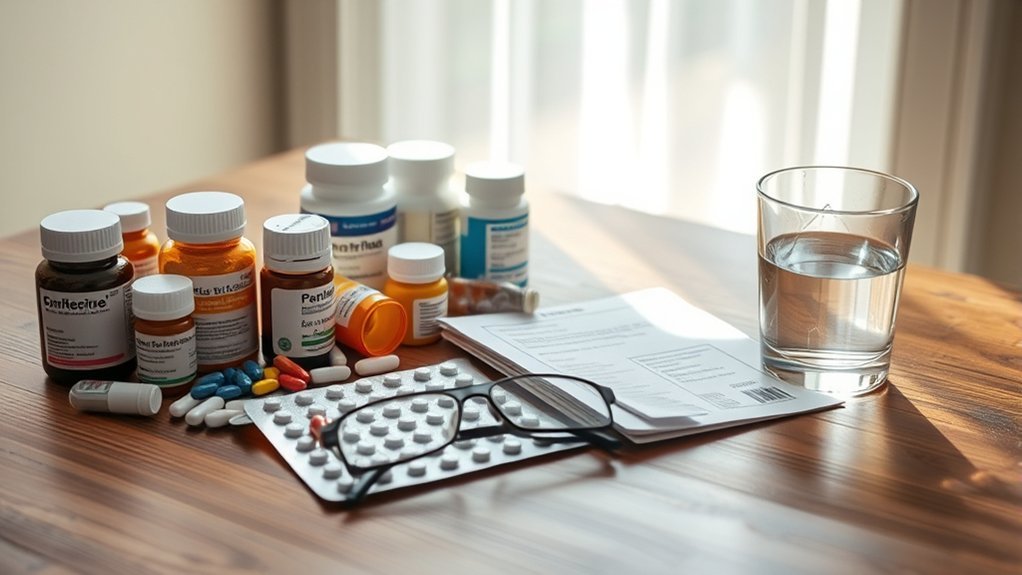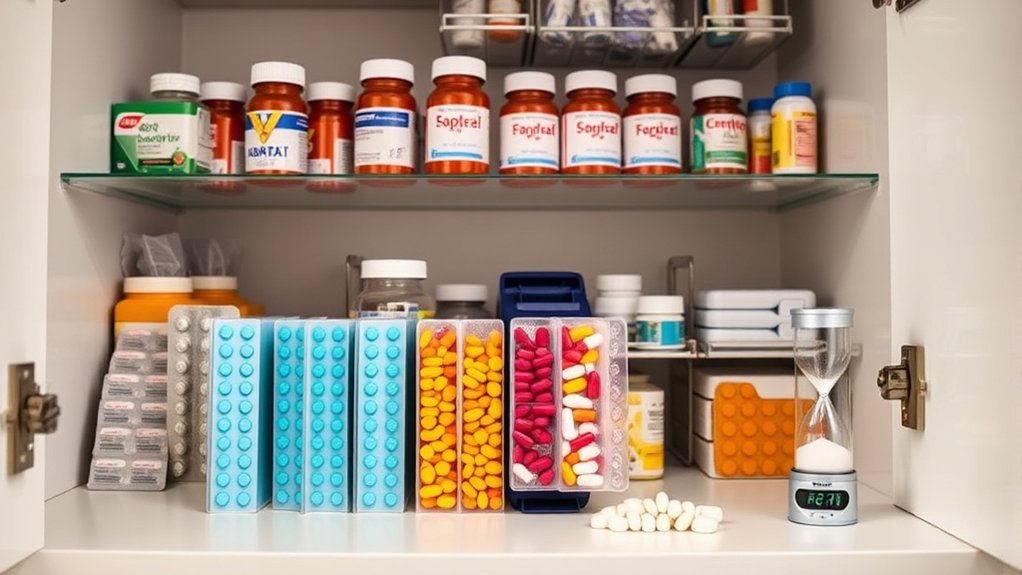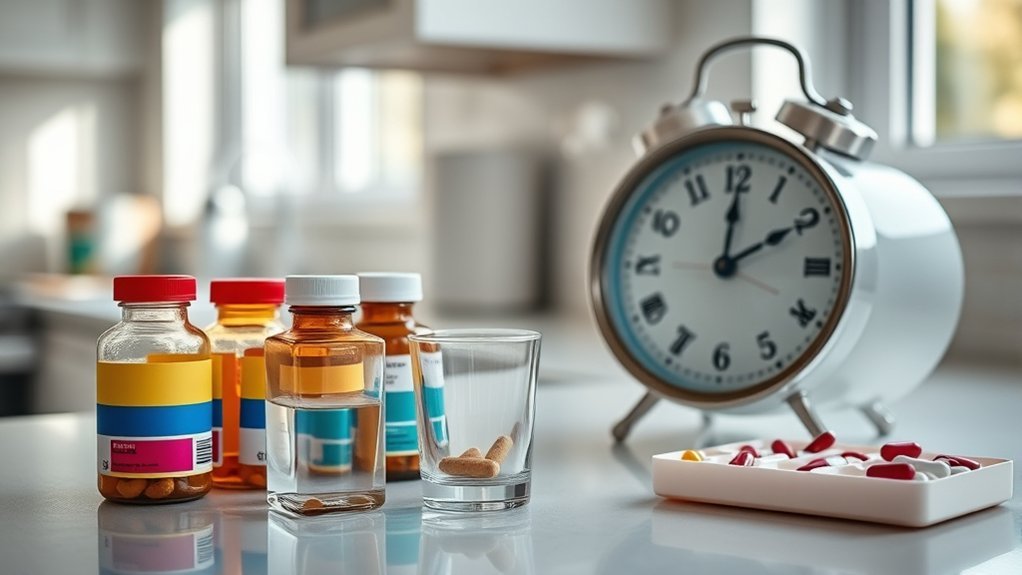When it comes to managing your medications, precision and organization are key. You need to verify each prescription, know the specifics of your medications, and establish a reliable intake schedule. It’s vital to recognize potential side effects and interactions as well. As you navigate these important steps, proper communication with your healthcare providers can greatly enhance your safety. Let’s explore the essential practices that guarantee your medications are effective and secure.
Understanding Your Prescription

Have you ever wondered what all the details on your prescription mean? Each component serves a specific purpose.
The patient’s name and date of birth guarantee the medication’s accuracy for the intended recipient. The medication name, dosage, and route of administration indicate what you’re taking and how to take it.
You’ll also see the prescriber’s information, which confirms the authority behind the prescription. The quantity prescribed and refills indicate how many doses you’ll receive and how often you can get more.
Additionally, you’ll find directions for use, often including timing and any special instructions, like taking with food. Understanding these details can enhance your medication adherence and guarantee that you use your prescriptions safely and effectively.
Knowing Your Medications

To use medications safely, it’s essential to understand their purpose and the potential side effects.
Knowing what each medication is meant to treat helps you make informed decisions about your health.
Additionally, recognizing side effects allows you to monitor your response and seek help when necessary.
Understand Medication Purpose
Understanding the purpose of your medications is essential for effective treatment and overall health management. Each medication you take is designed to target specific conditions or symptoms, and knowing what they do helps you adhere to your treatment plan.
For instance, antibiotics fight bacterial infections, while antihypertensives manage blood pressure. Familiarize yourself with the indications for each medication, as this knowledge empowers you to discuss your treatment with healthcare providers and make informed decisions.
Additionally, understanding how medications interact with each other can prevent complications. Always consult your pharmacist or healthcare provider if you’re unclear about a medication’s purpose.
This proactive approach guarantees you’re actively participating in your health management, optimizing your treatment outcomes.
Recognize Side Effects
How can you effectively manage your medication regimen without recognizing potential side effects? Understanding and identifying side effects is essential for your safety and treatment efficacy.
Start by reviewing the medication information provided by your healthcare provider or pharmacist. Pay attention to common side effects, but also be aware of severe reactions that may require immediate medical attention.
Keep a journal to track any symptoms you experience after starting a new medication. This proactive approach helps you differentiate between normal effects and concerning symptoms.
If you notice unusual changes, consult your healthcare provider promptly. Being informed empowers you to advocate for your health and adjust your treatment plan as necessary, ensuring best results in your medication management.
Organizing Your Medications

Organizing your medications is essential for ensuring effective treatment and preventing errors. Proper organization can help you manage your prescriptions, reduce the risk of missed doses, and streamline your healthcare process.
Effective medication organization is crucial for treatment success and minimizing errors in your healthcare journey.
Follow these steps to effectively organize your medications:
- Sort by Type: Group medications by their purpose, such as pain relievers, antibiotics, or chronic condition treatments.
- Label Clearly: Use labels that include the medication name, dosage, and expiration date for easy identification.
- Use a Pill Organizer: Consider a weekly pill organizer to simplify daily dosing and minimize confusion.
- Store Safely: Keep medications in a cool, dry place, away from children and pets, ensuring their integrity and safety.
Establishing a Medication Schedule
Establishing a medication schedule is essential for maintaining consistency in your treatment plan. By organizing the timing and dosage of your medications, you enhance their effectiveness and minimize the risk of missed doses. Here’s a simple table to help you create a personalized schedule:
| Time of Day | Medication Name |
|---|---|
| Morning | Medication A |
| Midday | Medication B |
| Evening | Medication C |
| Night | Medication D |
| As Needed | Medication E |
Make certain to set reminders using alarms, apps, or a physical calendar. This practice guarantees you take your medications as prescribed, leading to better health outcomes. Regularly review your schedule with your healthcare provider for any necessary adjustments.
Recognizing Side Effects and Interactions
Even with a well-structured medication schedule, it’s important to be aware of potential side effects and interactions that may arise from your medications. Recognizing these can help you manage your health more effectively.
Here are some key points to take into account:
- Common Side Effects: Familiarize yourself with the typical side effects of each medication, such as nausea or dizziness.
- Drug Interactions: Understand how your medications might interact with each other, affecting their efficacy or increasing side effects.
- Food Interactions: Be mindful of any food or beverage restrictions linked to your medications, which could alter absorption.
- Allergic Reactions: Stay alert for signs of allergies, such as rash or swelling, especially when starting a new medication.
Communicating With Healthcare Providers
Effective communication with your healthcare providers is essential for safe medication management.
Actively asking questions guarantees you understand your treatment plan, while sharing your complete medical history helps prevent adverse effects.
Being transparent and engaged can greatly improve your healthcare outcomes.
Ask Questions Actively
How can you guarantee your medication regimen is safe and effective? One key way is to ask questions actively when communicating with your healthcare providers. Engaging in dialogue helps clarify any uncertainties regarding your treatment.
Here’s how to approach it:
- Inquire about the medication: What’s it for, and how does it work?
- Understand dosage instructions: How often should you take it, and what if you miss a dose?
- Discuss side effects: What should you watch for, and what should you do if they occur?
- Explore alternatives: Are there other treatment options that might be more suitable?
Share Complete Medical History
Engaging in open dialogue with your healthcare providers is only part of ensuring a safe medication regimen. You also need to share your complete medical history. This includes past illnesses, surgeries, allergies, and current medications. A thorough history helps your provider assess risks and tailor your treatment effectively.
| Information Type | Details Needed | Importance |
|---|---|---|
| Past Medical Conditions | Heart disease, diabetes, etc. | Identifies risk factors |
| Surgeries | Dates and types of surgeries | Guides medication interactions |
| Allergies | Drug and environmental allergies | Prevents allergic reactions |
| Current Medications | All prescribed and over-the-counter | Avoids harmful interactions |
| Family History | Relevant hereditary conditions | Assesses genetic risks |
Storing Medications Safely
When you store medications correctly, you help guarantee their effectiveness and safety.
Here are four essential steps to guarantee proper storage:
Here are four key steps to ensure your medications are stored properly.
- Temperature Control: Keep medications at the recommended temperature, typically between 68°F and 77°F (20°C and 25°C). Avoid storing them in humid areas like bathrooms.
- Childproof Containers: Use containers with child-resistant caps. Guarantee medications are out of children’s reach, even if the cap is secure.
- Original Packaging: Store medications in their original packaging to maintain labeling information and expiration dates.
- Regular Checks: Periodically review your medications for expiration dates and discard any that are outdated or no longer needed.
Frequently Asked Questions
Can I Crush or Split My Pills for Easier Consumption?
You shouldn’t crush or split your pills without consulting your healthcare provider. Some medications are designed for controlled release, and altering them can affect their efficacy or safety. Always check before modifying any medication.
Are Over-The-Counter Medications Safe to Use With Prescriptions?
Yes, over-the-counter medications can be safe with prescriptions, but it’s essential you consult your healthcare provider first. They’ll assess potential interactions and guarantee your medications work effectively together without causing harmful side effects.
How Should I Dispose of Expired Medications Properly?
To dispose of expired medications, follow local guidelines. Crush pills, mix with water and cat litter, then seal in a bag. Alternatively, use designated take-back programs or pharmacy drop-off locations for safe disposal.
Can I Share My Medications With Family or Friends?
No, you shouldn’t share your medications with family or friends. Each prescription is tailored to an individual’s specific health needs and conditions, potentially causing adverse effects or interactions if taken by someone else.
What Should I Do if I Miss a Dose?
If you miss a dose, don’t panic. Just take it as soon as you remember, unless it’s almost time for your next one. Always consult your doctor if you’re unsure about the medication timing.
Conclusion
By following this step-by-step guide, you can navigate the complex world of medications like a seasoned sailor steering through stormy seas. Keeping your prescriptions organized and establishing a consistent schedule guarantees smooth sailing towards better health. Remember, open communication with your healthcare providers is your compass, guiding you through potential side effects and interactions. With careful storage practices, you’ll safeguard your medications, assuring they remain effective allies in your journey to wellness. Stay informed, stay safe.
